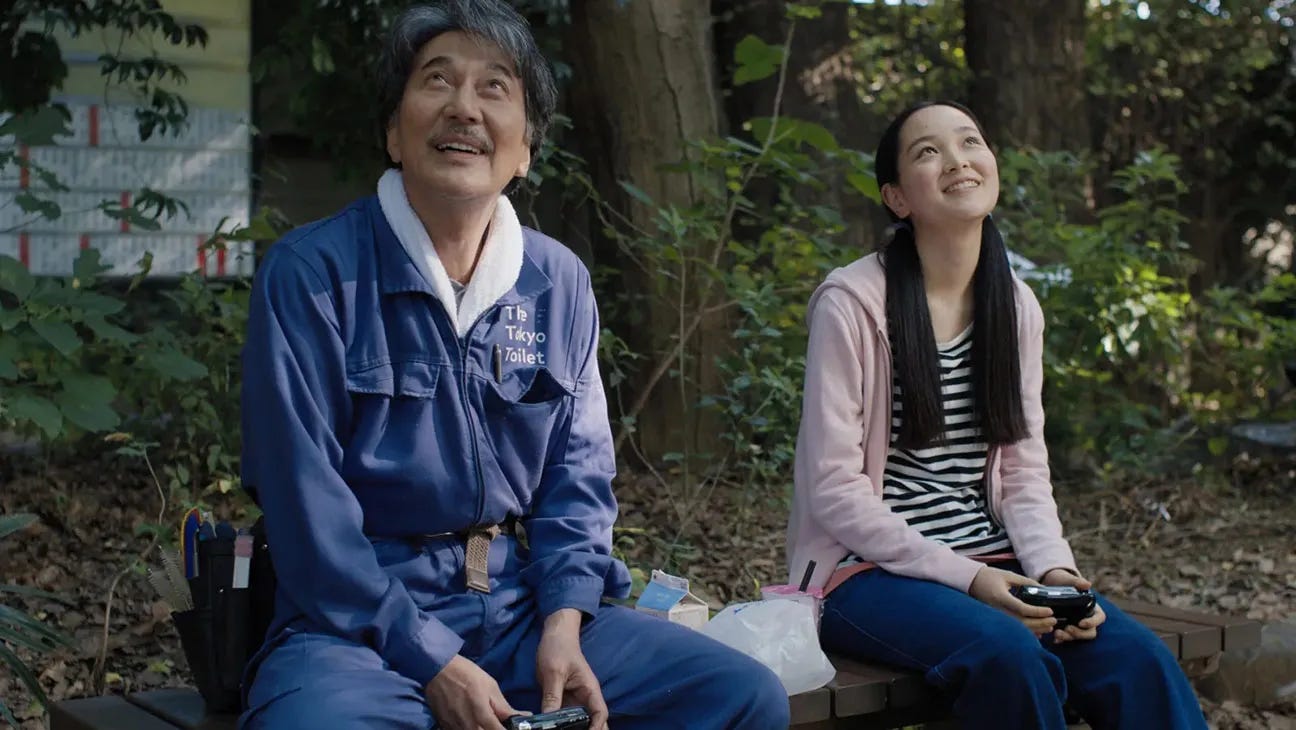I just felt this incredible need to write something quick about Perfect Days.
Wim Wenders’s latest movie presents as a Jeanne Dielman-like tale of toilet cleaner Hirayama, a middle-aged man seemingly plagued by his mundane existence. He wakes to the sound of early morning street sweeping, waters his plants with an obsessive diligence, drinks the same vending machine coffee, and speeds off to the toilets of Tokyo, where he cleans with intention. Hirayama doesn’t complain, nor does he say much at all, but our brains have conditioned us to be suspect.
As viewers we’re prone to projection and are quick to add moral value to the way one lives a life. We assume Hirayama must be lonely, dissatisfied, someone paralyzed by oppressive societal forces and thrust into a life of degrading labor. And while this may be the case for someone like Jeanne, that’s not Perfect Days.
Perfect Days has a whimsy that feels signature of Wenders, and it’s as refreshing as it is surprising. Hirayama collects vintage cassettes, drives listening to the “The House of the Rising Sun,” exchanges bizarre glances with a woman at a local park as they eat their sandwiches, and obsessively takes photos of leaves and branches. The film, with its gentle framings of every day occurrences, is a clear nod to Ozu, the director who made a career delving into the unremarkable lives of ordinary of people. And as was with Ozu and his subjects, we come to recognize a wholesome approach from Wenders. He carries an admiration for Hirayama and the life he’s constructed for himself in one of the largest cities in the world (which Wenders shoots lovingly).
What struck me, and what I assume other viewers, was how eagerly we wait for the shoe to drop, for the inevitable event that will pull Hirayama out of his sleepy life and into the bustling world. For every new interaction, I was anticipating deeper relationships and grander conversations—any sort of disruption, really. Every day, Hirayama eats lunch at the same restaurant, and as he sits looking around, I too would look around—at the background actors populating the scene—wondering if today was the day someone talked to him and later wondering why it was that I was craving such happenings. It’s only with space that I realize that I was trying to a conjure up a far less interesting movie.
The interruptions do come. There’s Hirayama’s manic underling, who enlists Hirayama in helping impress a girl he has a crush on. Hirayama introduces her to Patti Smith, and she gratefully gives him a kiss on the cheek before disappearing forever. Then, more significantly, Hirayama’s niece arrives, the daughter of his estranged and wealthy sister who has run away from home. We expect that she will teach him some sort of lesson about being in the world, but he doesn’t change his carefully calibrated life for her. He doesn’t even seem to mind that she laughs at him when he thinks Spotify is a person.
Hirayama simply invites her to join him, and teaches her of a simplicity away from the chaos. Of course, he’s affected by her company, moved by their sudden closeness, but Wenders doesn’t present us a man in need of changing. If anything, he just portrays a complex interiority, someone who has found salvation in structure, even if—from time to time—they may feel burdened by such a bold way to live.




